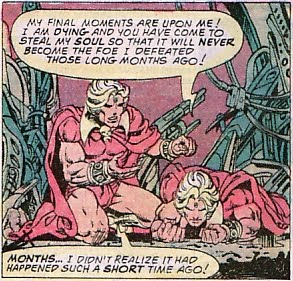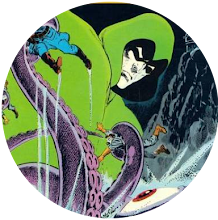And guess what?
Generally when stories get metaphysical they fall apart and, under any kind of scrutiny, reveal themselves to be nothing but sleight-of-hand, designed to create the illusion of meaning by a writer who simply couldn't figure out a proper way to end a tale. But not here.
The more you think about it, the more it makes sense. In fact, you could argue it makes a little too much sense, making Warlock's triumph perhaps a little too easy, although his meeting with a future self completely defeated by his ordeals in life and welcoming death reminds us that, in the world of Adam Warlock, even at the moment of success, things are never easy.
And, at the end of it all, a great big reset button's been pressed and none of it ever happened. Mostly in any fiction this'd ultimately feel like a cheat and a letdown because you'd have to ask what the point of all that drama was when it turns out none of it ever happened. It's the old Bobby Ewing in the shower conundrum. We might be glad to see normality restored but why have we spent all that time watching what's basically the world's longest dream sequence?
And yet there's no feeling of that here. Perhaps it's because we discover the Magus' church has simply been replaced by another false religion. Or maybe it's because we now know, with the Magus gone, there's no one left to stop Thanos' plan of bringing death to every living creature in the universe. Or maybe it's because we've seen a hint of the darkness that lies in store for our hero. Whatever it is, despite none of it ever having happened, at the end of it all, it still feels like everything - and a whole lot more - has happened.
























%20040a.jpg)
















































1 comment:
Great choice. Pretty much everything worked, didn' it?
Post a Comment